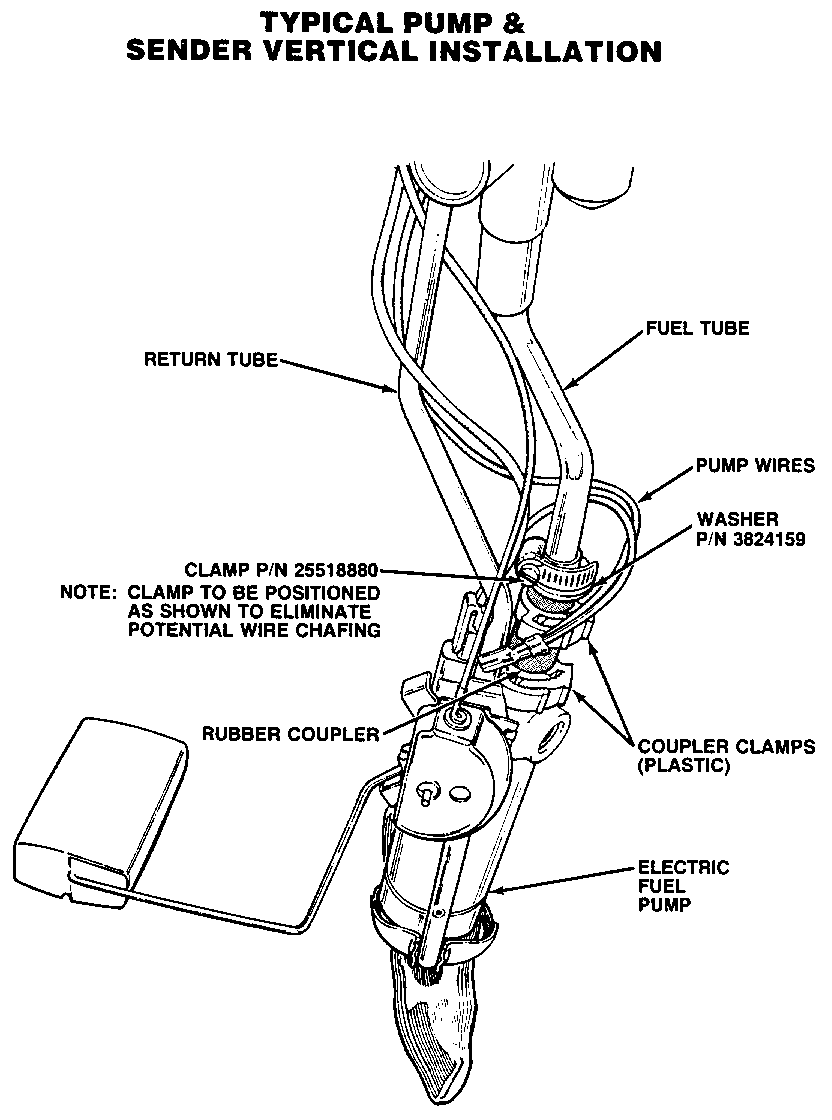IN TANK FUEL PUMP COUPLER DISCONNECT/REASSEMBLE

VEHICLES AFFECTED: 1989 B/F CARS, C/K/G/M/P/R/V/S AND T TRUCKS
Some 1989 vehicles equipped with throttle body injection (TBI) engines (see list below) may experience a condition where fuel delivery to the engine is interrupted. This condition may be the result of the in tank fuel pump becoming uncoupled from the fuel tank sender assembly.
Engine Displacement VIN Identification and RPO ------------------ -------- Passenger Cars -------------- 5.0L TBI (LO3) E 5.7L TBI (LO5) 7 Trucks ------ 2.5L TBI (LN8) E 2.8L TBI (LL2) R 4.3L TBI (LB4) Z 5.OL TBI (L03) H 5.7L TBI (L05) K 7.4L TBI (L19) N
Vehicles that are diagnosed as exhibiting this condition may be repaired by recoupling the pump to the sender, utilizing an additional clamp and washer inconjunction with existing parts and following service procedure below.
Service Procedure:
1. Following applicable shop manual procedures, remove fuel level sender unit.
2. Loosen both coupler clamps and remove coupler from sender.
3. With a clean dry cloth, wipe off fuel pump outlet tube, sender pressure pipe and coupler hose I.D.
4. Position plastic clamps on coupler and install coupler on fuel pump outlet pipe.
NOTICE: DO NOT LUBRICATE COUPLER TO FACILITATE ASSEMBLY.
5. Slide clamp, P/N 25518880 and washer, P/N 3824159 on sender pressure pipe insuring orientation of clamp is as shown in Illustration.
6. Bend rubber coupler slightly and install on sender pressure pipe.
7. Properly position both plastic clamps and tighten.
8. Slide washer and clamp down sender pressure pipe to a position against the rubber coupler.
9. With washer and clamp properly positioned and tight against coupler, tighten clamp.
NOTICE: INSURE CLAMP IS PROPERLY POSITIONED AS SHOWN IN ILLUSTRATION TO ELIMINATE POSSIBLE WIRE CHAFING.
10. Utilizing new 0-ring, P/N 3893116 install fuel tank sender unit into fuel tank.
11. Following applicable shop manual procedure reinstall fuel tank.
12. Start vehicle, inspect for any fuel leaks and correct as required.
Parts are currently available from CANSPO.
Use applicable Labour Operation and time.

General Motors bulletins are intended for use by professional technicians, not a "do-it-yourselfer". They are written to inform those technicians of conditions that may occur on some vehicles, or to provide information that could assist in the proper service of a vehicle. Properly trained technicians have the equipment, tools, safety instructions and know-how to do a job properly and safely. If a condition is described, do not assume that the bulletin applies to your vehicle, or that your vehicle will have that condition. See a General Motors dealer servicing your brand of General Motors vehicle for information on whether your vehicle may benefit from the information.
